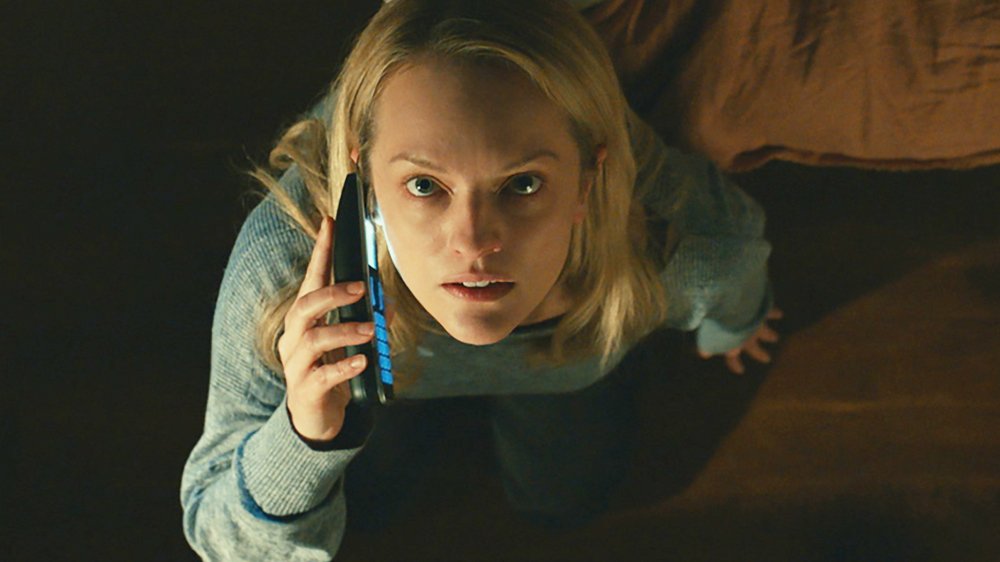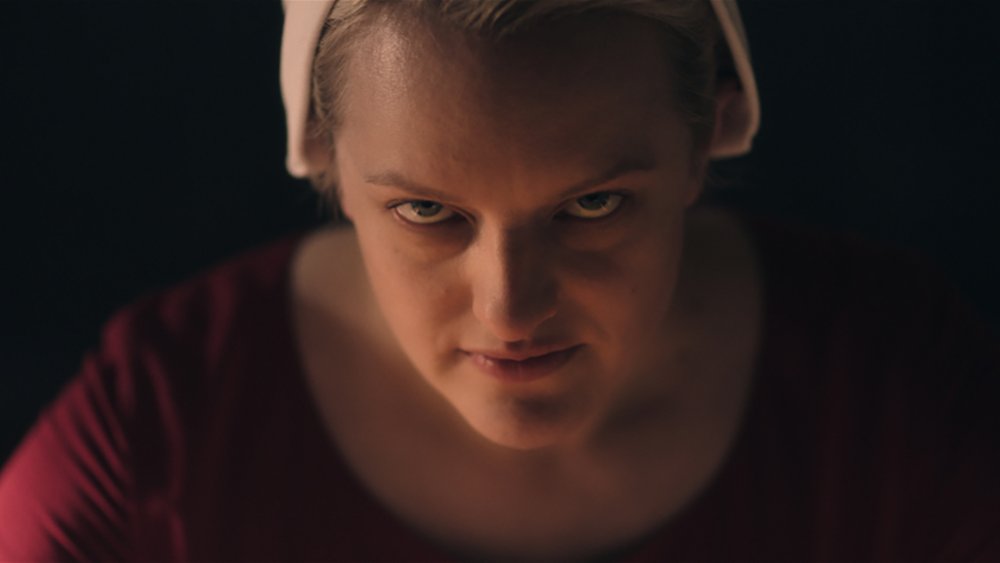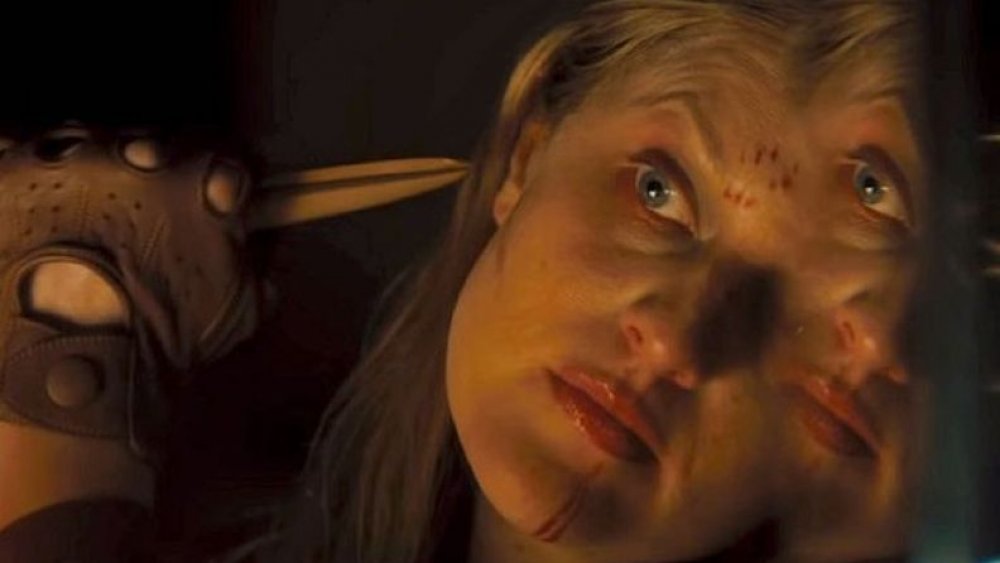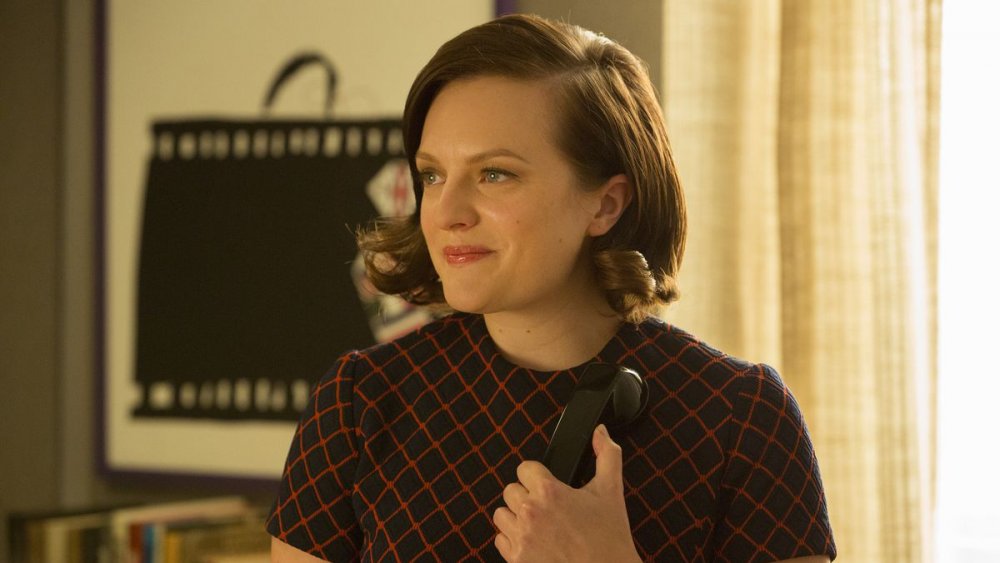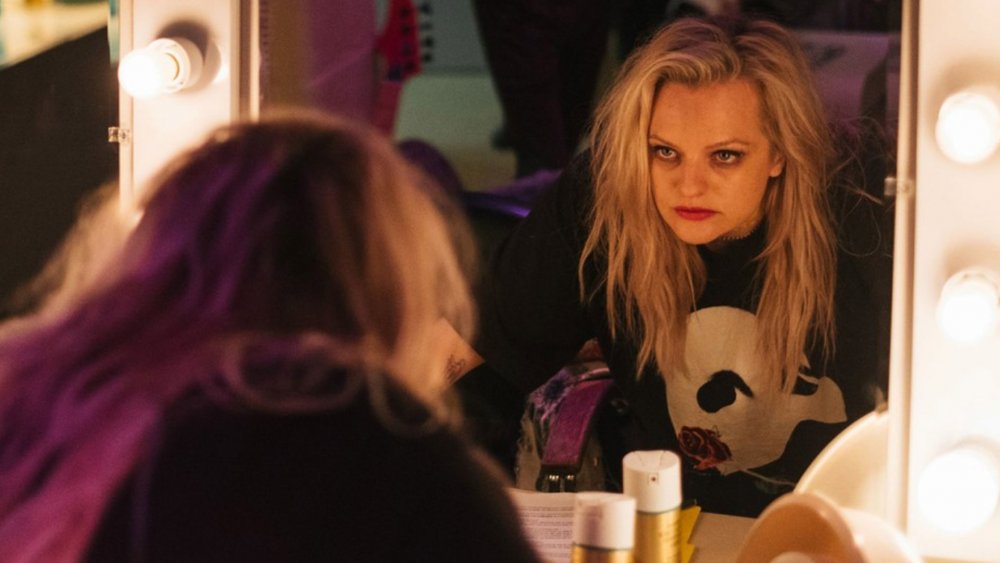Why Cecilia In The Invisible Man Looks So Familiar
Most horror fans are well aware of Universal Studios' ongoing attempts to mine the coffers of its own cinematic history to bring classic monster confections to modern audiences. However, Universal's planned Dark Universe essentially went up in smoke with the box office implosion of 2017's The Mummy. So when Universal announced a team-up with genre-centric studio Blumhouse Productions for a film featuring a character initially slotted for a prime spot in the Dark Universe, there really wasn't much hype surrounding the film. The character was the Invisible Man, and the 2020 film in which he appeared proved to be not a soft reboot of the Dark Universe but a bold, socially relevant, tense re-imagination of what classic monsters might be in the modern era.
In writer-director Leigh Whannell's The Invisible Man, such a monster comes in the form of Adrian Griffin (Oliver Jackson-Cohen), an abusive tech-genius-slash-billionaire with penchants for both experimenting on himself with radical new technologies and carrying out twisted revenge. The Invisible Man opens with the object of said man's controlling obsessions — his girlfriend Cecilia "Cee" Kass – making a daring escape from his life, and thus setting into motion a horrifying tale of desire and a need for control taken to the absolute limits. As The Invisible Man is a uniquely prescient take on the titular character, the film also sees Whannell crafting a modern heroine in the woman determined to extricate the abuser from her life.
If the woman who plays Cecilia in the film looks familiar to you, there's a good reason for it. Her name is Elisabeth Moss, and she's been front and center for some of the most important film and television projects in recent memory. Here's why you recognize Cecilia from The Invisible Man.
On The Handmaid's Tale, Elisabeth Moss wants the future to be female
The Invisible Man is far from the first time Moss has taken oppressive masculinity to task on screen. She's made quite the habit of it throughout her now three-decades-long (and counting) career. But never have Moss' "the future is female" dramatic stylings been on as stunning a display than they are on her searing, smash-hit streaming series The Handmaid's Tale.
Based on Margaret Atwood's dystopian sci-fi novel of the same name, The Handmaid's Tale is a Hulu-exclusive show, and is set in a not-too-distant future where the United States has become a theocratic-slash-militaristic state ruled by an oppressive male regime. That regime forces certain "fallen women" into becoming subjugated concubines subjected to ritualized assault at the hands of the largely infertile ruling class as a means of reproduction.
For three grueling seasons of The Handmaid's Tale, Moss has portrayed Offred (real name: June), the chief agitator in the land of the "fallen" who has become a face of the resistance. In her performance, Moss crafts a brave heroine who stands at odds with the oppressors of women in her overwhelmingly bleak world. Similarly, Offred/June has become a necessary voice of opposition in our own reality, with The Handmaid's Tale serving as a rallying cry for women to fight for their rights.
The show has also earned Moss a handful of shiny Emmy awards for her work as an actor on the show and as a producer. It looks like that trend will continue with the upcoming fourth season of The Handmaid's Tale.
Elisabeth Moss confronted her worst enemy in Us
Though Moss has become a small-screen icon for the modern era, she's also made her presence felt on the big screen. While Moss' cinematic tastes have largely erred toward the indie set, the actress has turned up in a couple of high-profile projects in recent years. The Invisible Man helped raise Moss' film persona in a huge way — but so did one of her biggest offerings from 2019: Jordan Peele's socially eviscerating horror flick Us.
The film finds a Black family's long-awaited beach vacation upended when their murderous doppelgängers show up to terrorize them. Lupita Nyong'o and Winston Duke play the heads of that ill-fated household (Adelaide and Gabe Wilson, respectively), while Moss and Tim Heidecker's woefully entitled anti-couple Kitty and Josh Tyler are pretty much the poster-children for modern society's toxic self-involvement.
Fittingly, Kitty and Josh made worthy sacrifices to the altar of Jordan Peele's doppelgänger uprising, with both characters meeting brutal ends at the hands of their other selves. The chance to play starkly different versions of the "same" character in Us provided Moss a suitable showcase for her boundless talent — with the actress imbuing her Kitty with a vacuous animosity before channeling that same energy into a form of violent psychosis for her counterpart. Alongside the masterful performances of her co-stars — and really the film itself — Moss' work in Us simply has to be seen to be believed.
Elisabeth Moss frequently stole the show on Mad Men
Moss has become one of the most respected and sought-after actresses in Hollywood over the last decade and a half, but she scored her first paying gig via a supporting role in a TV movie way back in 1990, so her rise to prominence has hardly been of the overnight sort. That rise gathered serious steam when Moss portrayed the President's daughter Zoey in a recurring role on NBC's political drama The West Wing. Her star was firmly cemented a year after that show left the airwaves.
In 2007, Moss claimed a life-changing role for a show set to premiere on a then-fledgling cable network that was just dipping its toes into the realm of original programming: the part of Peggy Olson on AMC's mid-century drama Mad Men, one of the the best TV shows ever produced.
Set in the male-dominated world of New York advertising in the 1960s (and in 1970 during the second half of the last season), the events of Mad Men are seen largely through the eyes of enigmatic ad man Don Draper (Jon Hamm). Into that fray came the wide-eyed naiveté of Moss' Peggy, a creative, headstrong woman who rose through the ranks of 1960s ad-land — moving from the profession of a secretary to an advertising copywriter to a copy chief. Along the way, Moss delivered astounding work as Peggy, often serving as a moral center for the show and stealing the narrative right out from under her co-stars.
Elisabeth Moss has become a legit indie film darling
If you've somehow managed to miss Moss' work in the aforementioned projects, it's probable you recognize the chameleonic actress from one of her many appearances in the indie movie scene. And by "many," we actually mean "virtually too many to count," because Moss has become sort of an indie movie darling over the past ten years.
You may remember her face from 2014's The One I Love, in which Moss portrays one half of a fractured couple (opposite Mark Duplass) whose weekend away gets hi-jacked in seriously weird ways. That same year found Moss working with indie ingenue Alex Ross Perry for a scene-stealing turn in Listen Up, Philip. Moss would re-team with Perry for 2015's Queen of Earth, in which she plays a woman spiraling in to psychosis, and again in 2018 with a show-stopping performance in the heart-wrenching rock drama Her Smell, which ranks among her finest work.
Most recently, Moss partnered with Josephine Decker (2018's marvelous Madeline's Madeline) for the indie biopic Shirley about famed horror scribe Shirley Jackson (The Haunting of Hill House). That movie is currently streaming on Hulu (and is more than worthy of a spot in your queue, by the way).
